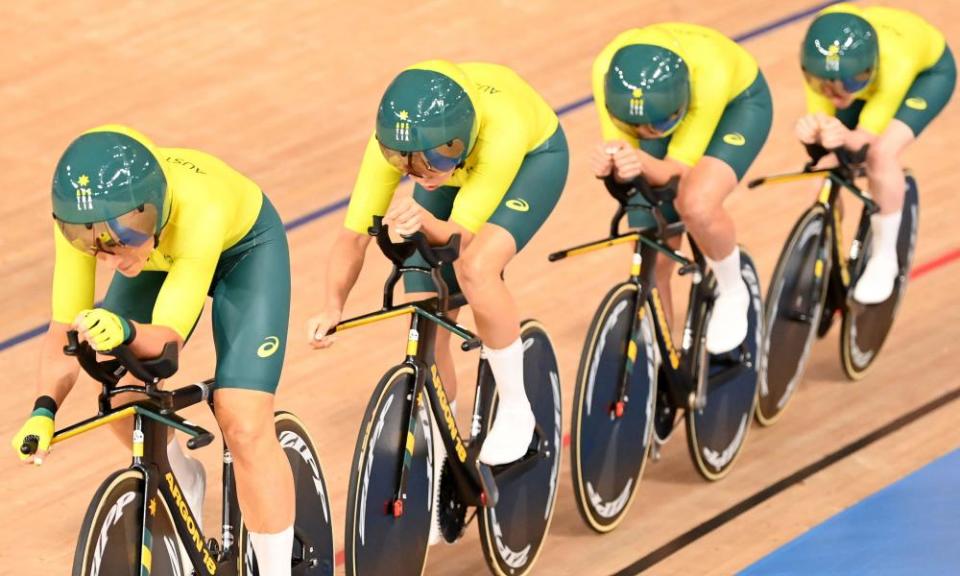Difficult decade continues in Tokyo for Australia’s Olympic track cyclists

Speaking last week ahead of the Tokyo 2020 track cycling competition, three-time Olympian Annette Edmondson was upbeat. “We’re definitely hoping to turn things around,” she said.
A horror opening session for Australia on day one at the Izu Velodrome on Monday has made that a tough ask. Edmondson’s team pursuit squad saw their gold medal hopes ended prematurely with a slow qualifying time, before a dramatic crash left her male counterparts in the lurch. While the men’s team pursuit quartet were ultimately permitted to have a second ride, their final time was just outside the top four, meaning they, too, will have to settle for an attempt at the bronze medal.
Related: Team GB eclipsed by Denmark’s Olympic record in men’s team pursuit
Australia’s track cycling program has had a challenging decade. Once a mainstay of the nation’s Olympic medal tally, their performance dipped at London 2012. In 2016 the team travelled to Rio with high expectations – the Australian Olympic Committee’s official predictions had indicated three gold medals. They returned with not a single one.
The highly fancied women’s team pursuit suffered a crash in training and never fully recovered. The men’s team – reigning world champions – put in a time in the final that would have broken the pre-Olympic world record. Except Great Britain had already broken it in qualifying, and did so again in the final to beat Australia by almost a second.
Olympic failure led to much soul-searching at Cycling Australia (now AusCycling). Simon Jones, formerly of Team Sky and British Cycling, was installed as the new head honcho. Jones’s methods have proven divisive – he has his critics on and off the track – but they appeared to be working. At the 2019 world championships, Australia finished equal first with six gold medals – the team appeared to be on the up.
Australia travelled to the world championships last year in Berlin with Tokyo 2020 firmly in mind. The team underperformed – deliberately so. But the postponement of the Olympics derailed their best-laid plans.
“To be honest, it’s a bit of a shame we didn’t have the Olympics that year, because we were not tapering or preparing for that worlds,” explained Edmondson. “All the athletes knew that we were just using it as a training phase. We weren’t in the form that we wanted to be at for the Games.
“Obviously in hindsight if we knew that the Games were going to be postponed, we would have absolutely targeted the worlds and we would have been more disappointed if those were the results that we got,” she continued. “Because it was part of a journey, and we knew in our minds that we were going to be where we need to come the Olympics, we never got the chance to show people that.”
All of which means it is hard to predict how the Australians will perform in Tokyo. Two of the team’s three medals in Berlin came via Steph Morton (in the individual sprint and with Kaarle McCulloch in the team sprint). Morton retired after Tokyo was postponed. Without a teammate, McCulloch cannot race the team sprint (she is entered in the individual sprint and the keirin instead).
The only race where Berlin provides some form guide is the men’s team sprint – Australia won an unexpected bronze medal, and have strengthened the team with the addition Matthew Glaetzer. The former world champion has barely raced over the past two years, after a cancer scare and an injury. If Glaetzer can return to his 2018 speed, when he was the fastest sprinter in the world, medals in the three sprint events are on the cards.
Related: Sign up for the Tokyo 2020 daily briefing: the best of the Olympics and Paralympics
But the blockbuster races to begin Australia’s track cycling campaign are the men’s and women’s team pursuits. Each squad – of five riders, with only four racing on each occasion – has world class pedigree; they were both world champions as recently as 2019. Yet after Berlin, where neither team earned a medal, they travelled to the Izu Velodrome as somewhat of an unknown quantity.
After Monday’s team pursuit qualifying, the Australian women have work to do. Their seventh placing with a time of 4:13.57 prematurely ends any hopes of a gold medal. The best they can now secure, in the rounds to come on Tuesday, is bronze.
For the men, given the crash, their final time was remarkable. But sport is cruel – the fatigue of the first few laps of the initial attempt, and the shock of the accident, left the Australians just slightly off the pace. If they can regroup they will be among the favourites in the race for bronze, which concludes on Wednesday.

 Yahoo Sport
Yahoo Sport 





































